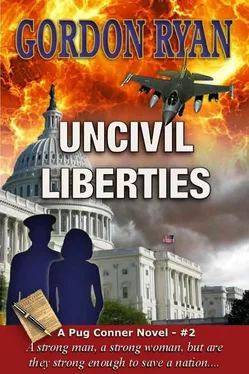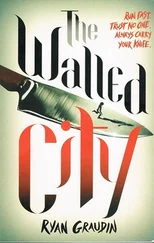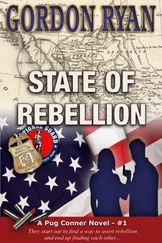Gordon Ryan - Uncivil liberties
Здесь есть возможность читать онлайн «Gordon Ryan - Uncivil liberties» весь текст электронной книги совершенно бесплатно (целиком полную версию без сокращений). В некоторых случаях можно слушать аудио, скачать через торрент в формате fb2 и присутствует краткое содержание. Жанр: Триллер, на английском языке. Описание произведения, (предисловие) а так же отзывы посетителей доступны на портале библиотеки ЛибКат.
- Название:Uncivil liberties
- Автор:
- Жанр:
- Год:неизвестен
- ISBN:нет данных
- Рейтинг книги:3 / 5. Голосов: 1
-
Избранное:Добавить в избранное
- Отзывы:
-
Ваша оценка:
- 60
- 1
- 2
- 3
- 4
- 5
Uncivil liberties: краткое содержание, описание и аннотация
Предлагаем к чтению аннотацию, описание, краткое содержание или предисловие (зависит от того, что написал сам автор книги «Uncivil liberties»). Если вы не нашли необходимую информацию о книге — напишите в комментариях, мы постараемся отыскать её.
Uncivil liberties — читать онлайн бесплатно полную книгу (весь текст) целиком
Ниже представлен текст книги, разбитый по страницам. Система сохранения места последней прочитанной страницы, позволяет с удобством читать онлайн бесплатно книгу «Uncivil liberties», без необходимости каждый раз заново искать на чём Вы остановились. Поставьте закладку, и сможете в любой момент перейти на страницу, на которой закончили чтение.
Интервал:
Закладка:
“Thank you, Mr. Secretary. Gentlemen, we got very little information from the video-taped interrogation we’ve just seen, part of which was taken at sea on the yacht. But, as you’ve also seen, the Thomson interrogation was a bit more informative. Then, we’ve acquired additional information from the data contained on his laptop. British and American intelligence agencies have been able to ferret out specifics about arms sales Wolff made, through his subsidiaries, to individual groups in England and Australia. In total, about two hundred hunting rifles of various caliber, scopes, an equal number of pistols and dozens of silencers, along with a couple hundred pounds of Semtex. But the sales, as small as they are, are not as important as the delivery information we obtained. Unfortunately, all weapons had been delivered prior to Wolff’s capture in Timor, and although we know where and when they were delivered, we have no idea where the weapons are now or, more specifically, who has them.”
Major Hampton, the British SAS officer, spoke first. “Mr. Johansson, you said sales to England and Australia. What about America?”
Secretary Austin answered. “As the gun control groups are always telling anyone who will listen, we already have plenty of those in every household, Major, we don’t need to buy them overseas or from clandestine arms dealers. You can buy them on nearly any street corner in the larger cities, or in gun shops, for that matter, with fake ID. But you can be certain they’ve added a few pounds of Semtex to their inventory as well.”
The CIA representative leaned forward in his chair and turned toward the briefer. “Mr. Johansson, from the written statement we received prior to this conference, all we’re talking about are a couple hundred rifles and handguns. What’s the particular flap about that level of weapons sales? Why is it important enough to involve Trojan?”
Lars continued the presentation. “Mr. Blanchard, as Secretary Austin indicated, this is not the type of threat for which we’ve planned. It’s not the amount or type of weapon that concerns us. It’s the delivery system for the attack. For years, we’ve focused on the interception or prevention of airline hijackers, despite our lack of complete control over foreign airports, as the recent KLM incident has shown.” He paused for a moment as those present reflected for a moment.
“We watch for weapons of mass destruction brought onto our shores, or even bio-chemical weapons. That level of threat perpetrated in a single, spectacular event, has been our greatest concern.”
Secretary Austin interrupted. “And those concerns still exist, and we have to be prepared to deal with them.”
“Exactly, but small arms…?” Blanchard queried, holding out both hands, palm up, in a “so what? ” gesture.
“Mr. Blanchard,” Secretary Austin continued, “if the information from Wolff is correct, the terrorist groups-and it should be noted we cannot confirm this is a Middle-East Al Qaida operation, it could be another of the Islamic splinter groups from Indonesia-have determined to go ‘low-tech’ for their next phase of operations. They learned one very significant fact from 9/11. They hurt us with over 3,000 deaths, and infuriated our nation. We brought down two Middle Eastern governments as a result. And they learned even more from the KLM incident: we’ll kill 300 to save 3,000, however distasteful it is. Afghanistan and Iraq, plus the Nobel Eagle Air Force action, demonstrated that we won’t stand for that kind of attack. But they also learned that the economic damage from 9/11 was far greater in the long run. After the KLM incident two months ago, the airline industry has once again nearly shut down. Two major companies are on the brink of bankruptcy after having barely recovered from the events of 9/11. It took over three years for the stock market to right itself again. No guesses on how long it will take us if this plan succeeds. The public furor over President Cumberland’s decision to take down the airliner, and the congressional demand to be notified immediately about future incidents before they’re enacted, is ridiculous, but it’s served to further lower confidence in our government. The stock market is always a victim of such public discord.”
Austin paused, scratched his chin, and looked around the table. “While these large-scale operations like the Twin Towers are disastrous, they can only be accomplished infrequently and they depend on a lapse in security. But these terrorist groups are not stupid, gentlemen. We do ourselves a disfavor to make that assumption. Terrorists have learned even more from watching our evening news. Let me ask the group a question. About ten years ago, what single event caused the most internal disruption to our citizens, albeit on a local scale, around Washington D.C.? A disruption, I remind you, that could be repeated quite easily in any environment with little risk attached? And a disruption, gentlemen, against which we have very little, if any, defense?”
The small group of men was silent for several long seconds.
“Urban snipers,” Captain Rossiter said.
“Excuse me?” the CIA’s Blanchard said, leaning further forward.
“Urban snipers, Mr. Blanchard, as General Connor projected in his written report,” the young Australian said more confidently. “One man and a rifle. Two men, referred to as the Beltway Sniper, stopped most retail business, disrupted social outings and personal shopping, and even cancelled school sports events in Virginia and the surrounding area for nearly two months over ten years ago.”
Again the room was quiet for several seconds. Secretary Austin broke the silence. “Captain Rossiter is right on the money. We’re not talking about hijacking, or dirty bombs, or chemical or even biological weapons in our water, for that matter. From Wolff’s laptop, we’ve learned the basics of the operational plan, or at least, we’ve pieced it together from several sources of information, since Wolff only knew the types of weapons sold. We’re talking about dozens-perhaps hundreds-of two-man hit squads who will scare our citizens to death, forcing them into seclusion… and do the same to our friends in England and Australia, if the analysis is correct. And that, gentlemen, is a threat which will render the strongest army in the world completely impotent. The only defense is aggressive local law enforcement, and, of course, civilian militia groups acting as vigilantes who will cause us yet another type of problem all by themselves. Carry on with your briefing, Lars. Let’s distribute the specifics of what we know. Then I suggest we go home, get with our respective intelligence agencies, wring our hands a bit more, and then decide how we can counteract this new dimension of grass roots terrorism we face.”
“Mr. Secretary,” Pug interjected, “as important as it was to us to obtain this information, doesn’t it strike you as peculiar that an operator like Wolff was scraping the barrel, being used as procurement officer for small arms? Something doesn’t ring true about this whole scenario.”
“Are you saying this is beneath him?” Austin asked.
“Sir, what I’m saying is that I think there’s more. That we don’t know the whole story yet.”
Forty-five minutes later when the meeting broke up, Carlos Castro slipped alongside Cameron Rossiter as they walked down the hallway. “I was surprised to see you here this morning. Going straight to another meeting?”
“No, we’re going to reconvene at the British Embassy at two.”
“How about some lunch?”
“Great. Your boss owes me dinner for a yacht charter, right?” Cameron smiled. “I’ll happily let you pay.”
Carlos laughed. “It was a short cruise, part of it in a rubber dingy. You’ll have to settle for a hot dog and a Coke in the park.”
Читать дальшеИнтервал:
Закладка:
Похожие книги на «Uncivil liberties»
Представляем Вашему вниманию похожие книги на «Uncivil liberties» списком для выбора. Мы отобрали схожую по названию и смыслу литературу в надежде предоставить читателям больше вариантов отыскать новые, интересные, ещё непрочитанные произведения.
Обсуждение, отзывы о книге «Uncivil liberties» и просто собственные мнения читателей. Оставьте ваши комментарии, напишите, что Вы думаете о произведении, его смысле или главных героях. Укажите что конкретно понравилось, а что нет, и почему Вы так считаете.












